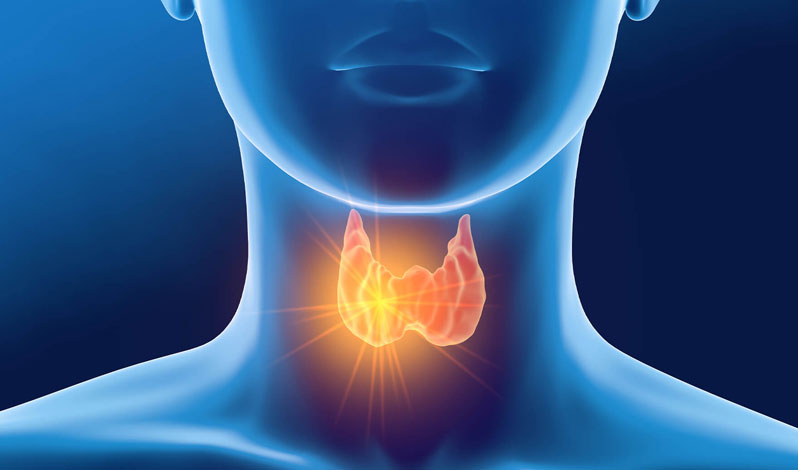
12, Jan 2021
How many of you know what the thyroid is?
Your thyroid is a small butterfly-shaped gland weighing less than an ounce and located at the base of your neck.
Despite its small size, the thyroid gland controls the rate at which every cell, tissue and organ in your body functions, including your muscles, bones, skin, digestive tract, brain, heart and many more.
It produces the hormones T3 and T4. These hormones regulate how efficiently cells convert nutrients into energy — a chemical activity called metabolism.
The thyroid gland plays a tremendous role in human health. Overproduction or underproduction of thyroid hormones can cause significant health concerns.
Out of approximately 20 million Americans who suffer from some form of a thyroid disorder, 60 percent are unaware of the condition.
If you do not get treated, you will have an increased risk of osteoporosis and cardiovascular disease. When the thyroid gland works too hard thereby overproducing T4, the condition is known as hyperthyroidism.
The condition may be caused by an autoimmune disorder called Graves’ disease or postpartum hormonal changes. It is 5 to 10 times more prevalent in women than men.
Hyperthyroidism may make you feel jittery, irritable and anxious.
Some other symptoms are insomnia, abnormal weight loss, rapid heart rate, frequent bowel movements, even diarrhea, excessive perspiration and increased appetite.
The first line of treatment for hyperthyroidism is drug therapy. If that doesn't resolve the condition, a dose of radioactive iodine may be tried by destroying thyroid cells.
Removing some of the thyroid gland can be an option when other treatments don't work or aren't advisable.
When the thyroid works too little, thereby underproducing T4 the condition is known as hypothyroidism.
This results in slowing down of the body’s functions.
Some signs may include generalized fatigue, lethargy, forgetfulness, constipation, dry skin, muscle pain, hair loss, unexplained weight gain and drowsiness.
Hypothyroidism is sometimes associated with goiter, an enlargement of the thyroid gland.
Hypothyroidism is usually treated by taking supplemental thyroid hormone.
Understanding hypothyroidism and hyperthyroidism early on will help you recognize the symptoms and find the right treatment strategy before you experience the long-term effects of this common condition.
Your primary care physician typically will diagnose and treat the thyroid disorder, or they may refer you to an endocrinologist in certain situations.
When you eat iodine-containing foods such as iodized table salt, seafood, bread and milk the iodine passes into your bloodstream.
More: Mitra: Balance COVID-19 risks, fatty foods with safety, exercise
More: Mitra: Many Americans living with prediabetes without knowing it
More: Mitra: Short of breath? What you need to know about your lungs
Extracting this necessary ingredient from your blood, the thyroid gland then makes two kinds of thyroid hormone: thyroxine (T4) and triiodothyronine (T3).
The thyroid's output consists primarily of T4.
Most of the T3 the body needs is created outside the thyroid in organs and tissues that use T3, such as the liver, kidneys, and brain.
These tissues convert T4 from the thyroid into T3 by removing an iodine atom.
When the thyroid gland gets messages in the form of thyroid-stimulating hormone (TSH) from your master gland, also known as the pituitary gland at the base of your brain, it produces thyroid hormone that secretes it into your bloodstream in quantities needed for the metabolic needs of your cells.
TSH levels in the blood rise or fall depending on whether there is enough thyroid hormone in your body.
High TSH levels prompt the thyroid to produce more hormone until TSH levels come down to a constant level.
Conversely, a low TSH level signals the thyroid to slow down production.
The most common blood test for thyroid disorders is a thyroid-stimulating hormone (TSH).
Low levels of TSH are the most reliable indicator of hyperthyroidism, whereas high TSH in the bloodstream indicates hypothyroidism.
Treatment for any thyroid disorder typically includes a medication to help regulate the thyroid hormone production.
Thyroid disorders do have a genetic component.
If someone in your immediate family has a thyroid condition, your doctor may recommend a TSH test.
If you are experiencing any unexplained fatiguability, your doctor may also want to check that the thyroid is functioning correctly.
Though thyroid diseases are not preventable, they are treatable.
January is thyroid awareness month.
Increase your thyroid awareness by speaking to your doctor to learn more about diagnosis, testing, and management.
Dr. Sue Mitra is accepting new patients and can be reached at 321-622-6222 or info@suemitra.com. Call now to determine the next steps to ensure your thyroid awareness.
Dr. Sue Mitra and her staff strive to offer their patients the best care, advice and services available in the medical field with the goal to keep patient healthy & happy.

Dr. Sue Mitra is board certified in international medicine. She is seen here with a Cologuard, which is a noninvasive colon cancer screening test. (Photo by: Tim Shortt/Florida Today)